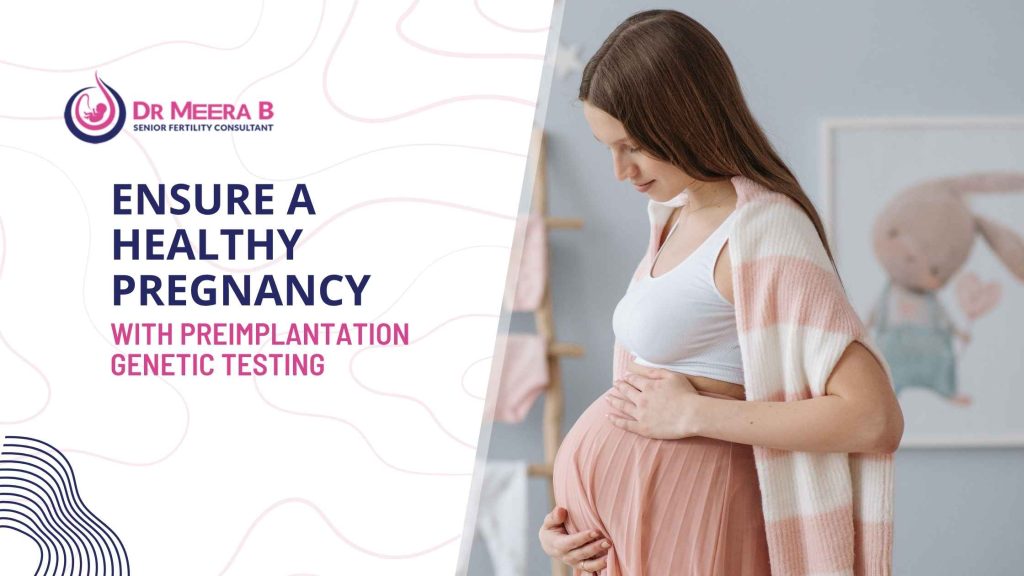
Preimplantation genetic testing (PGT) is a specialized diagnostic technique used during the IVF process to analyze embryos before implantation. It identifies chromosomal abnormalities or genetic mutations that could lead to failed pregnancy, miscarriage, or inherited diseases. At Dr. Meera B’s place of practice, this technology is used to enhance pregnancy success and safeguard the health of the future baby.
Couples who may benefit from preimplantation genetic testing include:
Dr. Meera B will assess your medical history and advise whether PGT is suitable for your fertility plan.
PGT-A is short for Preimplantation Genetic Testing for Aneuploidies. It screens embryos for chromosomal imbalances—conditions where there are missing or extra chromosomes—which can result in conditions like Down syndrome or lead to miscarriage.
PGT-M refers to Preimplantation Genetic Testing for Monogenic or Single-Gene Disorders. It helps detect specific inherited diseases such as thalassemia, cystic fibrosis, or Tay-Sachs. Dr. Meera B recommends the appropriate testing based on your family history and risk profile.
The genetic screening process starts with standard IVF. After fertilization, the embryos are cultured for 5–6 days until they reach the blastocyst stage. At this point, embryo biopsy is performed—gently removing a few cells for analysis. The genetic information from the biopsy is examined to determine if the embryo is suitable for transfer. This screening helps choose the healthiest embryo, minimizing risks and maximizing success.
Yes, embryo biopsy is a safe and highly refined procedure. It is typically done at the blastocyst stage and does not harm the embryo’s development. Performed by experienced embryologists at Dr. Meera B’s place of practice, it enables accurate genetic and chromosomal testing without affecting the embryo’s potential to implant or grow into a healthy baby.
IVF with genetic testing goes a step beyond standard IVF by incorporating PGT. While traditional IVF relies on morphological grading of embryos (how they look under a microscope), genetic testing gives a deeper understanding of their chromosomal and genetic integrity. This reduces the chances of miscarriage, failed implantation, or genetic disorders, helping achieve a successful and healthy pregnancy under the care of Dr. Meera B.
Chromosomal testing helps detect abnormalities in chromosome numbers such as aneuploidy (missing or extra chromosomes). These issues are a leading cause of miscarriage, developmental delays, and implantation failure. By detecting such abnormalities early, PGT-A performed at Dr. Meera B’s place of practice improves the likelihood of choosing a viable embryo for a healthy pregnancy.
Absolutely. Through PGT-M, couples with a known genetic mutation can prevent transmission of that condition to their child. Conditions like sickle cell anemia, Duchenne muscular dystrophy, or fragile X syndrome can be identified in embryos before implantation. Preventing inherited diseases through this proactive approach gives couples peace of mind and secures a healthier future for their child.
Booking a consultation is simple and can be done in three convenient ways:
Her experienced team will help you schedule your visit at Dr. Meera B’s place of practice.
Success rates with preimplantation genetic testing depend on several factors such as maternal age, embryo quality, and overall health. However, studies show that PGT can increase live birth rates by as much as 20–30% in certain populations. With Dr. Meera B’s extensive experience in reproductive medicine, the success rates are further optimized through personalized care and world-class protocols.
The cost of PGT-A or PGT-M depends on the number of embryos tested and the complexity of the genetic condition being screened. During your consultation, Dr. Meera B and her team will provide a transparent cost estimate and help you understand any additional steps involved in your IVF cycle.
Whether you’re an older mother, a couple with past IVF failures, or someone with a family history of genetic illness, genetic screening could significantly improve your odds of having a healthy baby. Dr. Meera B evaluates each case individually and helps you decide the best course of action based on your fertility goals and medical history.
With over 30 years of experience, Dr. Meera B specializes in managing couples with fertility issues at both national and international levels.
Meera Bhavan, Pattathanam East, Kollam, Kerala 691505
meerahridya1@rediffmail.com
+91 9447145101
Consultation Time:-
Mon- Sat : 6pm - 8pm
Sunday :10am - 1pm
